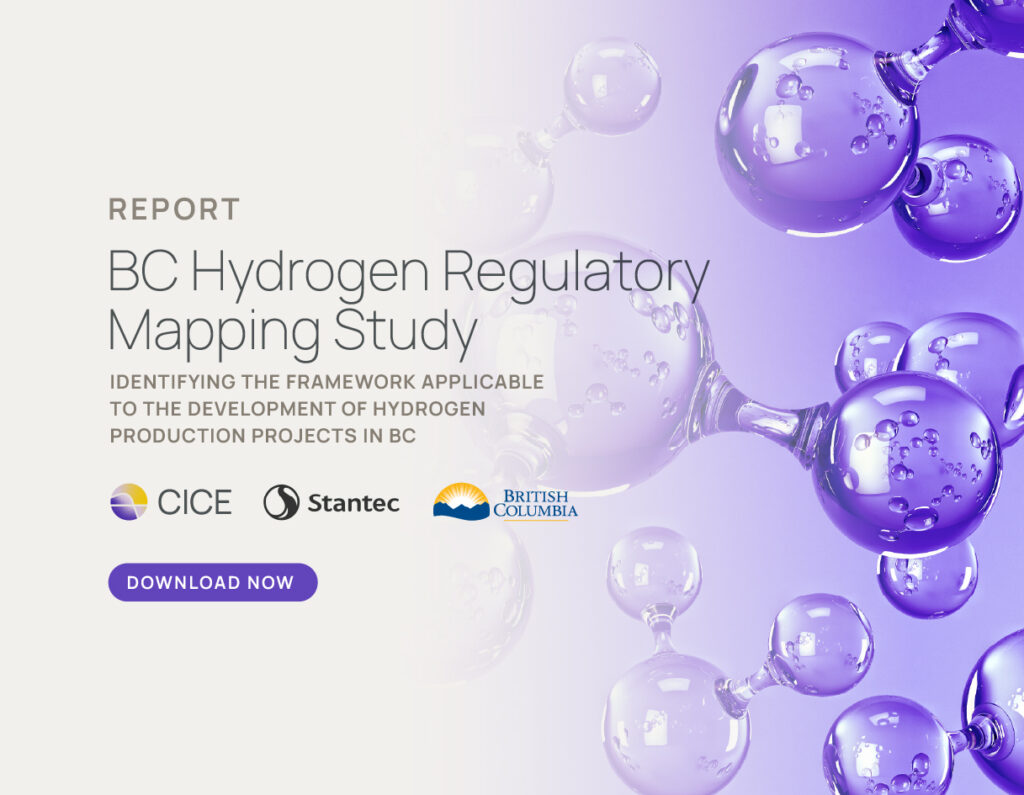
New study analyzes the current state of hydrogen regulation in British Columbia
Vancouver, BC – June 13, 2023 – The BC Hydrogen Office of the Ministry of Energy, Mines and Low Carbon Innovation (the Ministry) and the BC Centre for Innovation and Clean Energy (CICE) have released the B.C. Hydrogen Regulatory Mapping Study. This study identifies the current gaps, opportunities, and barriers to establishing an efficient and effective regulatory framework for advancing clean hydrogen projects in British Columbia.

The B.C. Hydrogen Regulatory Mapping Study was produced by Stantec Consulting Ltd. on behalf of the Province and CICE. The study aims to analyze the current regulatory framework for hydrogen production projects in British Columbia and offers recommendations to clarify the regulatory process. To illustrate how different regulatory approvals may apply, the study examines six representative low carbon hydrogen projects with different production pathways. Additionally, the study identifies the key stakeholders who may be involved in the regulation of hydrogen in B.C.
“Any emergent industry like hydrogen production will require consideration of how it might be governed and regulated, and whether the existing regulatory framework presents a barrier to the industry. By proactively clarifying the approval process and identifying potential gaps and areas for improvement, we are providing proponents and the public with important guidance on how to advance hydrogen as a low carbon energy source in British Columbia, while protecting the environment.”
Brian Yates
Vice President and Regional Leader for StantecCurrently, over 50% of Canada’s hydrogen and fuel-cell companies are in B.C., and the province accounts for about 60% of research investment in hydrogen and fuel-cell development. The proxy production pathways examined in this study include hydrogen production from natural gas with carbon capture and storage, hydrogen production from electrolysis with renewable electricity, and hydrogen production from methane pyrolysis. In addition, the study also considers ammonia and methanol production from low carbon hydrogen.
“To accelerate the advancement of low carbon hydrogen projects from B.C. to the world, significant regulatory opportunities and roadblocks must be addressed. Collaborative intelligence efforts such as the B.C. Hydrogen Regulatory Mapping Study provide a pathway for policymakers, industry stakeholders and members of the public to do just that – a critical step in unlocking and scaling the full potential of this emerging industry.”
Ged McLean
Executive Director, B.C. Centre for Innovation and Clean EnergyAbout CICE
The British Columbia Centre for Innovation and Clean Energy (CICE) is an independent, not-for-profit corporation that helps fund the development, commercialization and scaling of made-in-B.C. clean energy technologies and solutions – from Canada to the world. We unite B.C. innovators, leading corporations, government, academia, communities, and Indigenous rights holders around one primary focus: Advancing the world towards a net-zero carbon future. Together with our members, we expand the possibilities of clean energy innovation like the future of the planet depends on it. Because it does. www.cice.ca
For questions or interviews, please contact: info@cice.ca

